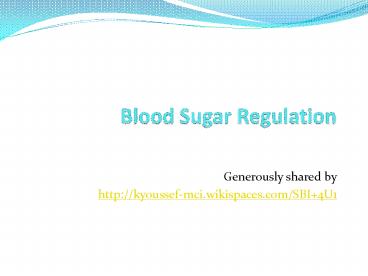Blood Sugar Regulation - PowerPoint PPT Presentation
1 / 20
Title:
Blood Sugar Regulation
Description:
Glucagon Figure 45.12 Example of Insulin s Effect on ... GLUT 4 Protein Vesicles Insulin Glucose Glucose Canadian Connection Frederick Banting & Charles Best ... – PowerPoint PPT presentation
Number of Views:125
Avg rating:3.0/5.0
Title: Blood Sugar Regulation
1
Blood Sugar Regulation
- Generously shared by
- http//kyoussef-mci.wikispaces.com/SBI4U1
2
Pancreas
3
Pancreas
4
Pancreas
- Two cell types to produce
- digestive enzymes exocrine glands (acini)
- hormones islets of Langerhans
1 2 of pancreas are the islets of Langerhans
5
Islets of Langerhans
- Two hormones are produced
- insulin beta (ß) cells
- glucagon alpha (a) cells
blue cell nuclei green insulin red
glucagon
6
Hormone Structure
- insulin
- peptide hormone
- glucagon
- peptide hormone
- Insulin and glucagon are referred to as
antagonistic hormones.
7
Glycogen
- A glucose polymer made up of many glucose
subunits - Storage form of glucose
- Stored within liver and muscle
8
Action of Insulin
9
Example of Insulins Effect on Body Cells -
Muscle Cell
Glucose
OUTSIDE CELL
Insulin
Insulin Receptors
Signal Transduction Pathway
Exocytosis
INSIDE CELL
GLUT 4 Transporters (proteins that transport
glucose across plasma membrane)
GLUT 4 Protein Vesicles
10
- When is insulin released? after eating
hyperglycemia
beta cells
cellular signals for insulin release
decreased blood sugar
increased glucose uptake
glycogen production in liver
11
Action of Glucagon
12
- What does glucagon do? breaks down glycogen
hypoglycemia
alpha cells
cellular signals for glucagon release
increased blood sugar
glucose release from liver
glucose production in liver
13
Diabetes Mellitus Type I
- also known as juvenile diabetes or
insulin-dependent diabetes - Cause
- immune system attacking insulin-producing beta
cells - no insulin production
- Symptoms
- increased thirst, hunger and urination
- Treatment
- daily dosage of insulin
14
Diabetes Mellitus Type II
- also known as adult-onset diabetes or
non-insulin-dependent diabetes - Cause
- Poor diet, lack of exercise
- Excess glucose in the blood for a long period of
time causes the pancreas to become overworked and
tired - Beta cells produce some, but not enough insulin
(deficiency) - A reduction in the number of functional insulin
receptors - reduced responsiveness of cells to insulin
insulin resistant
- Symptoms
- increased thirst, hunger and urination
- fatigue / lethargy
15
(No Transcript)
16
Type II Diabetes
- Treatment
- maintain healthy diet and frequent exercise
- medication only upon progression of disease state
- Regular exercise can reduce and stop symptoms
Glucose
Insulin
Glucose
Exocytosis
Insulin GLUT 4 Protein Vesicles
Exercise GLUT 4 Protein Vesicles
17
Canadian Connection
- Frederick Banting Charles Best
- Nobel Prize 1923
- Insulin isolation
- tied off ducts to digestive tract
- cell producing digestive enzymes shrivelled
- only islets of Langerhans remained
18
Video Testimonies
- University of Alberta
- developed islet cell transplant method
- Islet Transplant Animation
- Photo Journal
- News Feature
19
Stress Regulation
20
Classwork/Homework
- Section 8.2 Pg. 383 1-8,9

